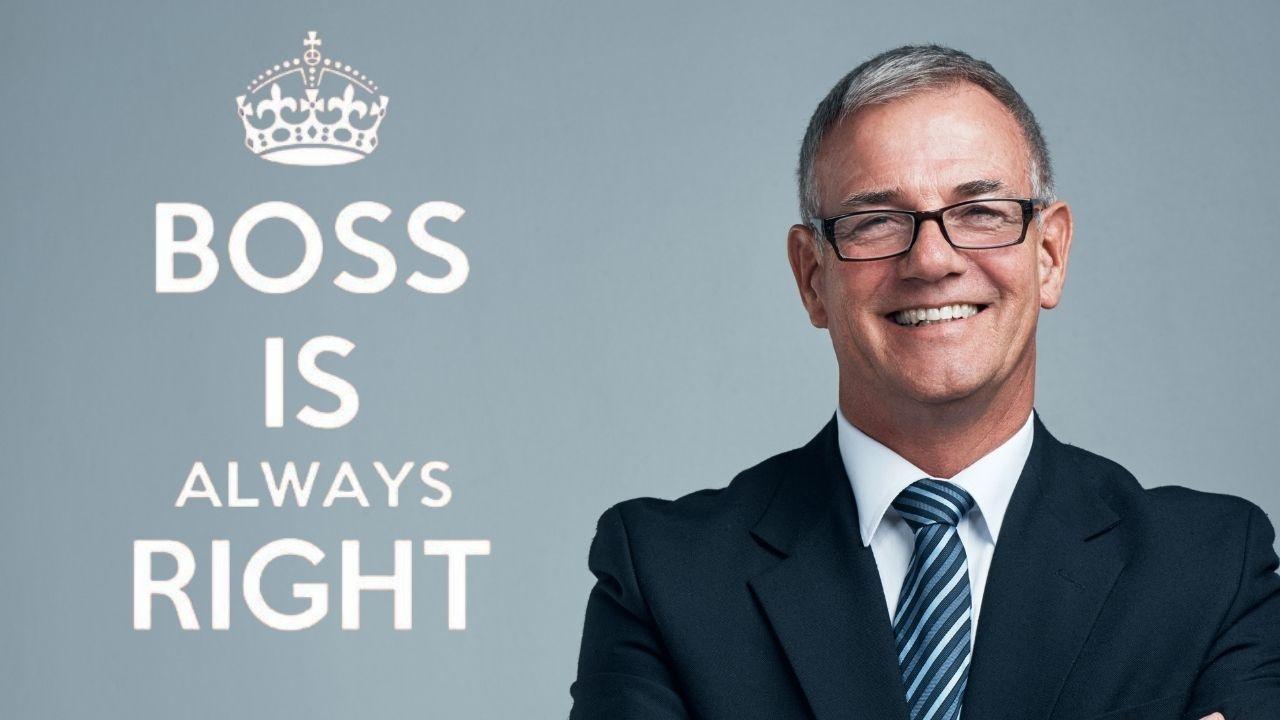You have not yet added any article to your bookmarks!

Join 10k+ people to get notified about new posts, news and tips.
Do not worry we don't spam!

Post by : Mikael Ariff
The phrase “the boss is always right” is a familiar echo in workplaces today. It serves as a reminder of hierarchical respect, but its true nuances delve into the psychology of leadership, power dynamics, and interpersonal interactions.
This long-standing belief has historically influenced workplace culture, shaping how employees engage with authority. However, it raises an important question: Should we still cling to this mindset, or is it time for a reevaluation?
This common expression traces back to eras when leaders’ commands went unchallenged. Historically, strict compliance in factories, military formations, and traditional occupations was the norm. Authority was seldom questioned; compliance ensured order.
However, in today’s collaborative workplace, such a rigid system may stifle creativity and teamwork—attributes that thrive in environments where multiple voices are valued.
Despite advancements, many modern leaders cling to this mentality. Why? Because it simplifies decision-making.
When authority declares, “My word is final,” discussions are cut short, and the focus shifts quickly to results.
Nevertheless, this shortcut can detract from employee morale. Ignoring feedback fosters disengagement, gradually silencing valuable contributions and creating an illusion of tranquility masking deeper dissatisfaction.
Psychological experts refer to this tendency as authority bias. People naturally align themselves with those in charge, often following orders they don’t fully endorse. This inclination stems from a desire for harmony, as workplaces generally reward acquiescence rather than dissent.
As a result, even when employees recognize potential issues, they may hold back—staying in management’s good graces feels strategically advantageous.
Every organization cultivates its own unique culture, complete with unspoken rules. Employees quickly adapt to the prevailing attitude of “the boss is always right”. Sometimes fear keeps them silent, but often it’s the urge to fit in.
Silence, however, can dampen innovation. A workplace dominated by conformity often prioritizes compliance over creativity.
When employees feel their voices are muted, resentment can escalate, leading to a decline in motivation and increased stress. Many talented individuals leave not due to workload, but feeling undervalued.
True innovation flourishes through dialogue, constructive criticism, and fresh ideas. A ineffectual culture where only the boss's voice is acknowledged can hinder progress. History shows that companies often falter when employees hesitate to speak up.
When authority figures mistakenly perceive themselves as infallible, they may lean toward micromanagement, losing interest in employee input. This undermines team confidence, leading to disengagement. Eventually, the most innovative and driven employees may exit.
Many organizations have crumbled because leaders ignored crucial feedback. In a setting where questioning authority is taboo, mistakes may proliferate until corrected.
Contemporary leadership requires psychological safety. Leaders who encourage open dialogue bolster stronger teams. Active listening fosters a sense of shared accountability, speeding up growth.
A true leader doesn't expect total agreement. The finest workplaces elevate spirited discussions, welcome diverse suggestions, and recognize that great ideas can emerge from any source.
A skillful leader seeks to get it right, rather than simply being right.
Working with a stringent boss can be challenging, but opting for silence is not a solution. Here are effective strategies to express concerns without jeopardizing your position:
Choose the Right Moment: Approach your boss when they are calm and focused.
Stay Polite and Objective: Rely on data over emotions.
Acknowledge Their Perspective: Begin by respecting their views.
Provide Alternatives: Present constructive solutions rather than mere complaints.
Build Trust: Show consistency and professionalism to gain credibility.
Even the most rigid leaders begin to listen when approached with respect.
The future of work hinges on collaboration rather than command. Organizations today thrive on transparent communication, adaptability, and collective decision-making.
Authority is less about control and more about fostering team success. The outdated notion of “the boss is always right” fails to resonate in our fast-paced world. Effective leadership means establishing trust, valuing fresh ideas, and empowering others to flourish.
A true leader encourages open discourse. They absorb, learn, and administer with respect, because workplace success springs from a collective where every voice is valued.
This article serves educational purposes to explore workplace culture, psychology, and leadership norms. It does not represent any specific organization or provide professional advice. Readers should consult experts for workplace issues. The publisher is not liable for interpretations based on this content.










Bahrain Health Minister Meets Child Psychiatry Association Leaders
Discussions focused on strengthening child and adolescent mental health services and expanding preve

Bear Attack in Gua Musang Injures Teen Forager in Forest
19‑year‑old Orang Asli forager bitten by a bear in forest near Kampung Guh, Gua Musang rushed to hos

Saudi Arabia Braces for Multi‑Day Dust Storms and Strong Winds
Saudi Arabia’s National Center of Meteorology issues Red & Orange alerts as dust storms, strong wind

Cumilla Gas Cylinder Blast Injures Four Two Critical
Family of four, including a toddler, injured in Daudkandi, Cumilla gas cylinder blast two in critica

Social Media Sparks Deadly Mob Attacks on Bangladesh’s Star and Prothom Alo
Online incitement on Facebook fueled mobs to burn Dhaka newspaper offices and cultural centres, whil

Jailed Ex‑PM Imran Khan Gets Follow‑Up Eye Treatment Stable
Pakistan’s former prime minister received second eye injection at PIMS Hospital officials say he was